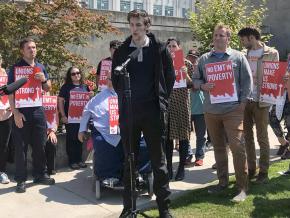EMT wages are an emergency
reports from Seattle on a campaign by EMTs fighting for a living wage.
EMERGENCY MEDICAL Technicians (EMTs) in the Seattle area are fighting back against low pay.
EMTs who work for American Medical Response (AMR) — a division of the multibillion-dollar conglomerate KKR that has plenty of money — start out at close to minimum wage. The city of Seattle’s contract with AMR already requires that the company pay EMTs the prevailing wage in similar jurisdictions — but the city isn’t enforcing this provision.
So EMTs are organizing a campaign to raise wages and cut the cost of their medical plan.
The campaign is two-pronged. Teamsters Local 763, which represents the workers, is negotiating for a new contract with AMR. In addition, Kshama Sawant, Seattle’s only socialist City Council member, is proposing that the city force AMR to pay a minimum of $25 an hour.
Starting pay for EMTs in Seattle is only $15.54 an hour. Other cities on the West Coast with a similar cost of living to Seattle have a starting pay that is 28 percent higher. Seattle EMTs also pay 25 percent of their health care premiums, compared to only 15 percent for other cities on average.

In Seattle, the average monthly rent for a one-bedroom apartment is nearly $2,000. This means that a starting EMT would have to pay almost their entire net income just for rent — which is why many EMTs live in crowded conditions in Seattle or commute long distances to work.
At a rally for EMTs on August 3, Megan, an employee at AMR for two years, said:
My one-bedroom apartment...is [also] housing one prior AMR employee, and one other AMR EMT-B. It isn’t uncommon for either me or the other EMT who is sharing the living room space to stop in for 15 minutes and then escape somewhere else to avoid disturbing anyone’s awkward sleep schedule and keep the space under 85 degrees. Cramped living arrangements that resemble crash pads more than homes are not uncommon among my co-workers.
Low wages and high health care costs are creating a crisis for many EMTs. Yearly turnover at AMR is almost 50 percent. The suicide rate for EMTs is higher than it is for many other occupations. Many AMR workers have to take two and even three jobs to get by.
These low-paid workers also are forced to use other strategies to make ends meet. As Meagan said, “I also used to donate plasma twice a week, every week for years.”
Such conditions create overworked and tired technicians, and pose a threat to the health and safety of the public, as well as the workers. Tired and stressed medical workers make more mistakes.
THE AUGUST 3 rally and press conference showed the breadth of support for the EMTs at AMR.
Representatives from SEIU Healthcare 1199NW (which includes Harborview and Swedish Hospital nurses), Planned Parenthood workers, the Washington Federation of State Employees (WFSE, which represents workers at Harborview hospital), and disabled recipients of EMT services spoke.
The WFSE worker noted that conditions affecting EMTs affect other workers as well. “We don’t have enough money to pay for parking. When pay goes up, the parking rates go up. We need a job just to pay for the job. I live in Auburn because I can’t afford to live in Seattle. We want fair pay and equality!”
A recipient of EMT services said: “This is a hard job. It is a skilled job. They should be able to live in the city where they care for people. The disability rights community will stand with you.”
At the press conference and rally, Kshama Sawant called for supporters to come to an August 6 City Council meeting to support her resolution putting the council on record as supporting the city administration requiring that AMR pay a minimum of $25 an hour, with benefits equal to those of firefighters who work for the city.
The resolution would also ask that Mayor Jenny Durkan to submit the contract with AMR to the City Council for approval. The resolution would not legally bind the mayor, but it would put pressure on her.
At a packed City Council hearing on August 6, all of those who spoke on the issue supported the EMT resolution, with one exception: A representative of AMR talked about its “partnership” with the Teamsters and urged the Council to leave the contracting process alone.
Teamster representatives present didn’t agree with that AMR representative, however, and supported the adoption of the resolution. Dozens of EMTs turned out to support the resolution.
EMTs, service recipients and community members spoke eloquently about the value of EMTs to the community. One person talked about how her life was saved by EMTs. John, an EMT and founder of “Save Our EMTs,” confronted the City Council directly and demanded real action instead of rhetoric, saying, “Don’t just thank us for our service!”
All of the City Council members expressed sympathy with the EMTs. But they voted 6-2 to postpone voting on the nonbinding resolution until August 13 in order to check with the city’s Finance Department and investigate how the city budget would be impacted.
Sawant rightly called this out as political cowardice. She noted the contrast with how quickly the City Council repealed the head tax to pay for homeless services and housing under pressure from Amazon and other corporations.
Negotiations between the city and AMR continue, with a deadline of September 1. The Teamsters and AMR are still in contract talks as well. The next City Council hearing on the resolution in support of the EMTs will be on Monday, August 13, at 2 p.m.


